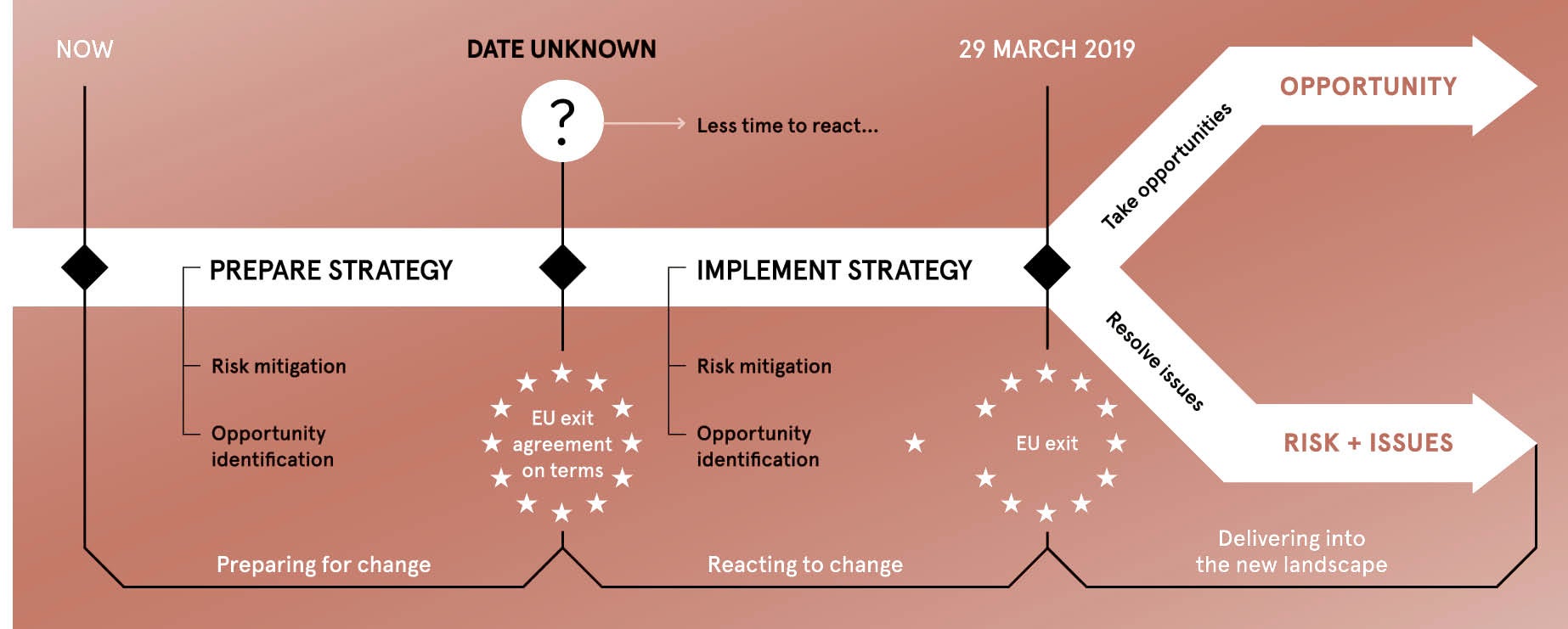
The UK will exit the EU on Friday March 29, 2019. Exactly what this will involve remains unknown. But the political and economic landscape could shift dramatically, bringing with it a raft of challenges and new opportunities.
For procurement, a specialism traditionally based on hard facts, the EU exit is proving to be a curve ball, thrusting it into unfamiliar territory.
In the absence of any concrete information on areas such as trade and freedom of movement, organisations should use these vital few months to assess their risks and draw up contingency plans that will enable them to respond to whatever the coming months might bring.
Assessing risks
Daniel Peck, a principal at Efficio, says: “Details of the Brexit agreement will soon begin to emerge, whether it’s a transition deal, a hard exit or something else. Public and private sector companies should be assessing the impact of change on their supply chains now and positioning themselves to capitalise on new opportunities.”
Arguably the biggest question mark hangs over freedom of movement. Since the 2016 referendum, the number of EU workers searching for jobs in the UK has dropped by 11 per cent.
Phil Woode, senior manager at Efficio, says: “The UK exit will have direct implications for many low-margin industries, such as construction, care, agriculture, retail and distribution, possibly resulting in further cost pressures.
“If labour costs increase, it could push some businesses to consider whether now is the time to invest in digitalisation and automation, the benefits of which could improve productivity and mitigate the effects of a skills shortage. The construction sector is already beset by a skills shortage and investing heavily in modular-build solutions. Other sectors may need to follow suit.”
Sourcing strategies, suppliers and contracts
According to Efficio, organisations should start by considering three core pillars of procurement: sourcing strategies, current suppliers and existing contracts. Those with a deep understanding of these areas, coupled with strong contingency plans to deal with change, are best placed to mitigate risk, manage disruption and seize opportunities.

Strategic sourcing
Businesses need to assess the full impact of the UK’s exit on existing sourcing strategies for their key categories of spend. Changes in cost drivers or the speed at which goods can be transported may be strong reasons to consider implementing alternative strategies.
“Clear visibility of existing sourcing strategies and an understanding of how sensitive they may be to factors triggered by the UK exit is crucial,” says Mr Woode.
“Knowing how far these factors may need to move for companies to change their strategies and having the required resources in place to be able to implement any changes will give businesses first-mover advantage.”
Suppliers
Understanding how suppliers and supplier markets will be impacted is another necessary consideration.
As Mr Peck points out: “Visibility is vital. The origins and traceability of goods are essential building blocks, so it’s important to understand your extended supply chain – your suppliers, but also their suppliers.
“If supply chain costs change, businesses are likely to feel the impact, either immediately through price increases or more gradually as suppliers seek to recover profitability in other ways.”
In worst-case scenarios, suppliers may conclude that certain contracts, or even their business, are no longer viable and seek to exit.
Mr Peck recommends working with key strategic suppliers, particularly those operating in low-margin environments such as construction, logistics and distribution, to develop a set of principles or plans to adapt to the changes a UK exit might bring.
Businesses should also seek to understand the key markets that their supply base is built on, for example labour or raw materials, and consider modelling the impact any movement in costs or regulations could have on their performance.
“Your company may be well prepared, but that doesn’t mean your suppliers or their suppliers will be,” says Mr Peck. “Assessing the supplier relationship will enable you to decide whether to renew, renegotiate or terminate contracts.”
Contracts
Organisations should be familiar with the terms of their supplier contracts as a matter of course, but it is particularly important in times of uncertainty.
According to Mr Woode: “Companies need to know exactly which contracts involve data transfer, freedom of movement, cross-border logistics or imported goods in the supply chain and, importantly, which are at risk due to change.”
Among the questions they should ask are when do contracts expire? What extension rights or options are there? What commercial models are suppliers on? What are the potential supplier performance risks in long-term agreements where businesses are locked in?
It’s also critical to assess the extent to which contracts offer a level of certainty and protection. For example, what constitutes force majeure? Does the UK’s departure from the EU apply? Which party picks up the cost of aligning to regulatory change?
“Understanding your contracts gives you a good base from which to react. You will know which areas are stable, where you have the most contractual protection and where you have the least,” says Mr Woode.
Time to act
Some businesses will undoubtedly ask themselves whether they can afford to invest time and money looking at what ifs? But these aren’t extraordinary measures and should form a core part of business-as-usual activities. Moreover, being underprepared carries serious risks.
Mr Peck concludes: “Without a clear understanding of their contracts, supply base and sourcing strategies, businesses leave themselves wide open to risk. While the EU exit will be a unique and momentous change in the market, it also presents an opportunity to prepare for general developments in the supply chain and future-proof your organisation in a changing world.”
Efficio is working with public and private sector companies to carry out detailed readiness analysis ahead of the EU exit. The service is designed to prepare organisations to make fast, structured change and mitigate risk when the time comes. To find out more please email [email protected] or visit efficioconsulting.com/brexitandprocurement


